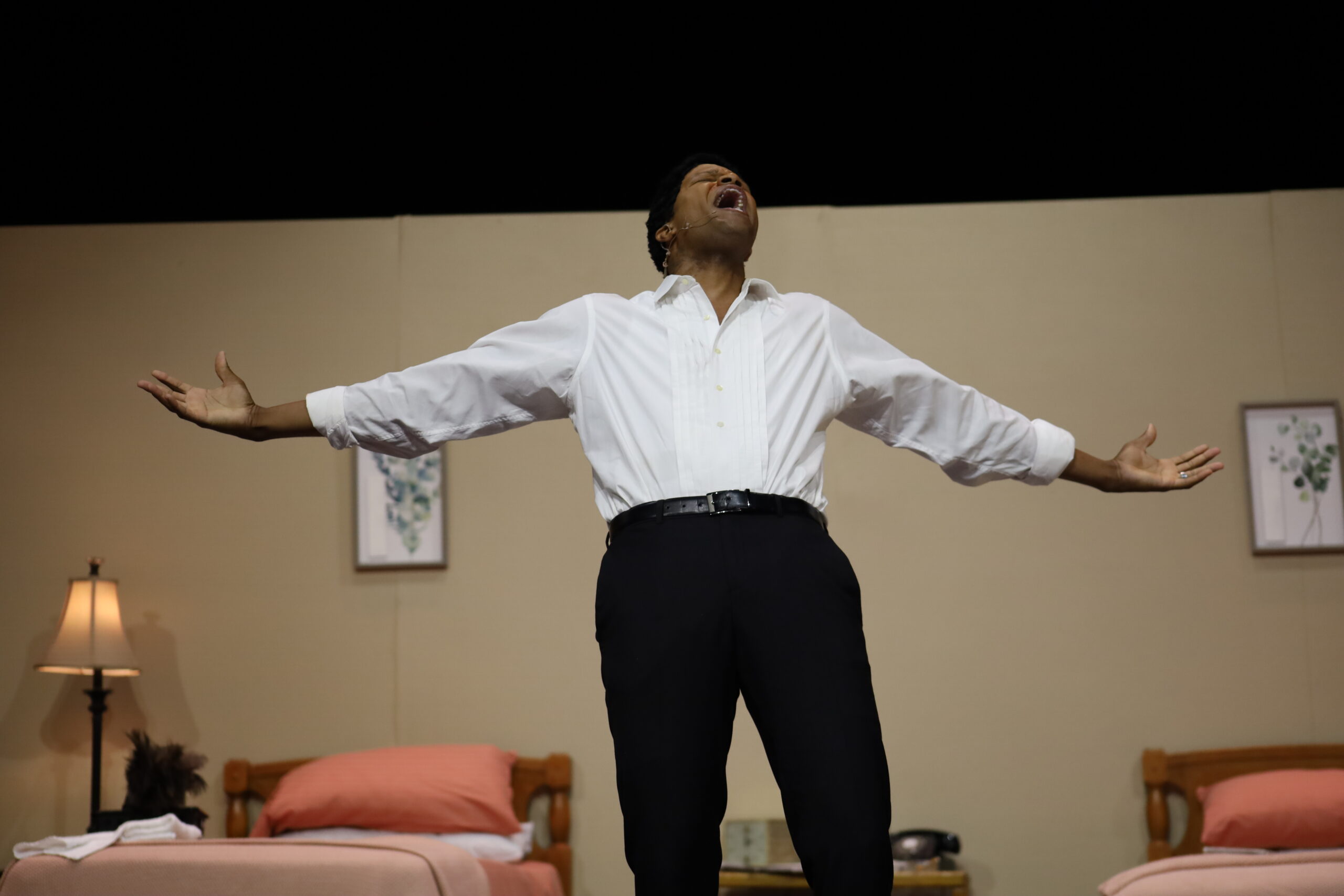A safe haven for Black travelers. A stomping ground for soul music elites. A near final resting place for one of the world’s most iconic leaders. The Lorraine Motel has lived many lives.
The famed facility takes center stage in the Inkwell Pictures’ play, Lorraine. Returning from its Juneteenth debut, the play will run at 4 and 8 p.m. on Saturday, September 23 and at 2 and 6 p.m. on Sunday, September 24 at the Riverside EpiCenter in Austell.
“The cast understands that the play is not about each character,” says Atlanta native Maurice P. Kerry, who has had roles in the FX hit Atlanta and Showtime’s The First Lady. In Lorraine, he plays William Warren, the fictionalized manager of the motel.
“It’s not about Aretha or Harry Belafonte, or Dr. King — it’s about the hotel itself, how different lives and the culture moved through it, how they influenced it and how it influenced them. The Lorraine is the main character,” he says.
A fusion of comedy, drama, song and spoken word, Lorraine grew in the minds of brothers and Inkwell founders Marvin and Melvin Coleman after Melvin’s visit to Memphis.
“We realized there’s not just a singular story here, but a treasure trove of history lessons,” Marvin Coleman says. “It picks up the last days of Dr. King’s life. We dive into the dynamics of the struggle and how music shaped the consciousness of the people and motivated them to change.”
Resting on the south edge of downtown Memphis, the motel is most recognized as the site of the April 4, 1968 assassination of the Rev. Martin Luther King Jr., but holds infinite histories. It was listed in The Negro Motorist Green Book, a state-by-state guide of hotels, restaurants, and other destinations that welcomed Black people amid the risk of violent, often fatal, and shamefully legal discrimination elsewhere.

It began as the Marquette Hotel in the 1920s, but Walter Bailey later purchased it and renamed it after his wife, Loree. Working at the motel switchboard on the day of King’s murder, she suffered a stroke and heart attack when she heard the shot and died on the day of his funeral.
“These parts of the story have been lost over the years,” says Executive Producer Cal Reese.
In 1991, the motel was transformed into the National Civil Rights Museum. A memorial wreath remains on the balcony outside of an untouched Room 306.
News outlets mostly captured big voices in response to King’s death. The Coleman brothers wanted to focus on more obscure perspectives — everyday people who worked at the motel.
Kerry plays alongside other fictional staffers: Tinesha Lynn as Yolanda, and Queen Sugar actress Ivory Shields as Raylene. He says they enjoy the freedom of making those characters their own. It’s not as much pressure as portraying a real person, but the heat is still on for a cast that lives the reality of being Black in America.
“We have a huge responsibility to the people who lived through this,” says Reese. “They know the struggle. But they also remember the music and how it made them feel.”
Music has long been a driver of protest and progress, whether through meaningful lyrics, or the money singers donated to fund organizers, from travel to bail money to legal fees.
“There was a closeness between the artists and the people and it showed in the support they gave,” Marvin Coleman says. “We’re more removed now, but because of segregation, you might’ve lived down the street from them, you might’ve known their family.”

Robin Antoinette Johnson and Angelo Diaz.
Toya Forman is proud to play the powerhouse Aretha Franklin, a leading financial supporter of the movement. Franklin was among many stars who stayed at the Lorraine after recording at Stax Records. Home to Otis Redding, Isaac Hayes, the Staples Singers and others, Stax was just a block away. They, along with Nina Simone, Tina Turner, Coretta Scott King and others, are portrayed in the play.
“The connection to the music goes back to spirituals, how the music is coded to spread our messages,” Forman says. “The entertainers were intentionally using their voices, their platforms, and that made a big difference.”
Most folks know the story of King’s assassination. And they know about Hosea Williams, Ralph David Abernathy, and the other freedom fighters who stood by him until his death. But a stroke of fortune gave the cast and crew incomparable living insight.
“During one of our readings, Mr. Abernathy’s daughter actually came by and shared her father’s stories,” Reese says of actor-activist Donzaleigh Abernathy. “She ended up staying for three hours, giving us direct accounts of what happened and helping us understand the nuances of their experiences. We’re so grateful to her.”
Such an interaction is one reason the Florida-based multimedia company chose Atlanta.
“The talent is undeniable here,” Marvin Coleman says, noting that 90% of the cast is local. “But it’s also the birthplace of Dr. King and so much of the movement. The street names, the murals — you can’t drive around Atlanta without seeing a figure from this play.”
Overall, the cast hopes viewers leave with a renewed confidence in society’s progress, despite the miles left to cover on the road to liberation for marginalized people.
It’s about hope, says Murray Duffey Sr.
His rendition of Sam Cooke’s wildly popular soul-stirring tune, “A Change is Gonna Come,” fades onto the stage as a flashback since the storied singer was killed four years earlier.
“It’s easy to look online, see tragedy all over the news and feel you’re living in a loop of disaster,” Duffey says. “Yes, it’s bad, but it has been much worse. We have to appreciate how far we’ve come while still working to go farther. We have to realize that a change did come. We’re living in the change that all of these people fought for.”
::

